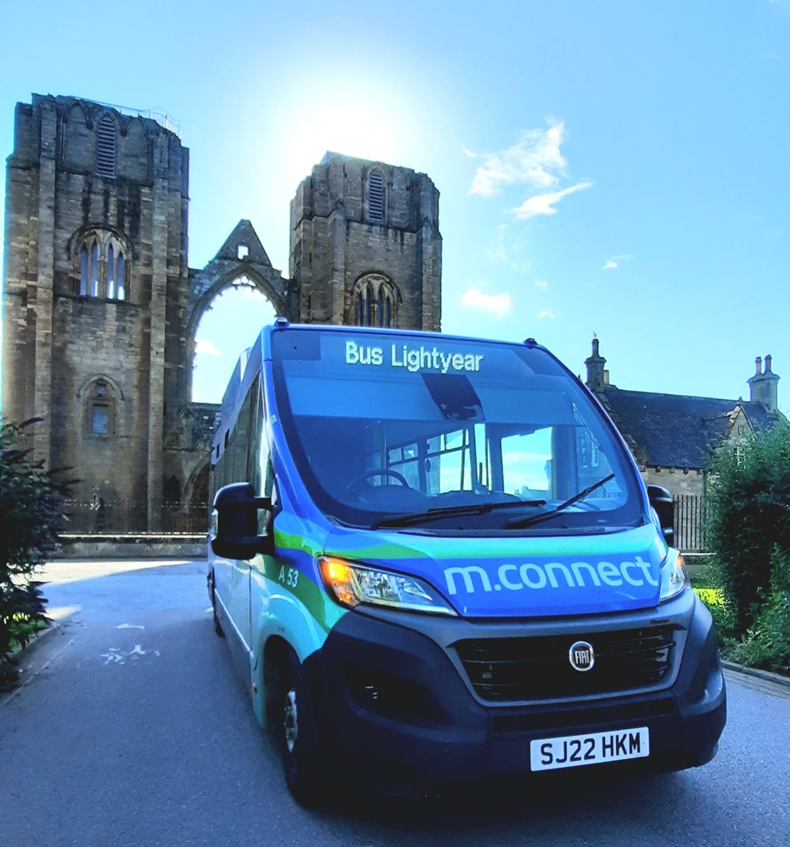A fairer public transport system for Scotland
Our National Transport Strategy outlines four priorities for our transport system: that it reduces inequalities; takes climate action; helps deliver inclusive economic growth; and improves our health and wellbeing.
This strategic direction has influenced the Scottish Government`s programme for transport infrastructure investment during the period 2022 – 2042, as set out in The second Strategic Transport Projects Review (STPR2), which prioritises projects that significantly contribute to the following objectives:
- A sustainable strategic transport system that contributes significantly to the Scottish Government’s net-zero emissions target.
- An inclusive strategic transport system that improves the affordability and accessibility of public transport.
- A cohesive strategic transport system that enhances communities as places, supporting health and wellbeing.
- An integrated strategic transport system that contributes towards sustainable inclusive growth in Scotland.
- A reliable and resilient strategic transport system that is safe and secure for users.
- Align well with National Transport Strategy 2 priorities.
- Can be delivered or significantly progressed within the short term.
- Performed best against COVID-19 recovery priorities.
Our public transport networks are integral to ensuring that our strategic aspirations for the transport system as a whole are met. In addition, the First Minister`s Policy Prospectus, Equality, opportunity, community: New leadership – a fresh start, published in April 2023, that by 2026 we will have advanced towards making our public transport system more accessible, available, and affordable, with the costs of transport more fairly shared across government, business and society.
While our public transport system faces a number of challenges which impact upon its efficiency and financial sustainability, there are also opportunities which can be seized upon to help ensure the long term viability of the system. These are outlined in greater detail in the Case for Change but in summary the main thematic issues arising are:-
- Long term decline in bus network and patronage predating Covid-19.
- Covid-19: Public Transport Patronage Recovery and Transition.
- Costs of using public transport relative to the costs of using the private car.
- Cost of living
- Equity of access to Concessionary Travel Schemes.
- Concessionary Travel Schemes – Financial sustainability.
- Unintended consequences of existing fares structures on public transport landscape
Glasgow Tripper Ticket: Increasing affordability and accessibility of bus – Case Study

Initially launched in 2017, the Glasgow Tripper ticket is a multi-bus ticket that can be used across the majority of bus operators on routes in Greater Glasgow and its surrounding towns, providing unlimited bus travel in and around the area for £6.10 per day or £24.60 per week.
This saves money for those passengers whose journeys require a transfer between routes operated by different bus operators, and adds convenience by providing a single ticket valid for all the journeys across all the operators.
With the original proposition, Tripper tickets were only available on a smartcard platform, the card had to be pre-ordered, and then tickets could either be purchased online or daily tickets could be purchased onboard certain buses on the day.
However, in 2023, a digital Tripper ticket was launched through some of the larger bus operator’s own mobile apps which resulted in a 500% increase in sales over the subsequent couple of months, demonstrating the demand for a multi-bus ticketing, the popularity of digital tickets, and the convenience of simple retail via established apps.
This scheme has been made possible by collaborative working amongst a number of bus operators in the Glasgow area including First Glasgow, McGill`s, West Coast Motors, Stagecoach West and Whitelaws.
Covid-19: Public Transport Patronage Recovery and Transition, costs of using public transport relative to the costs of using the private car and cost of living Crisis
Public Transport patronage has still not fully recovered since the onset of the Covid-19 pandemic with particularly slower rates of recovery noted in traditional commuter markets and in journeys made by older and disabled people.
The future prospects for patronage recovery relative to pre-pandemic levels still remain unclear due to uncertainties around the extent to which wider societal changes and the extent of working from home, which affect demand for travel, may remain embedded in the medium and longer term.
There is a likely demand for further subsidy to maintain current service levels in the face of reduced farebox revenue and commercial viability of services.
Scottish Ministers have already taken significant action and made significant investment to support public transport fares and to support public transport recovery as people have been encouraged to return to public transport.
We invest £300 million annually to deliver free bus travel for all children and young people under 22, as well as for eligible disabled people and everyone aged 60 and over. This means Scotland has the most generous concessionary fare scheme in the UK, with more than 2.3 million people eligible for free bus travel – encouraging more people to choose to take the bus and helping us meet our net zero ambitions by encouraging a shift away from cars.
Since 31 January 2022 when the under 22s scheme launched, over 116 million free bus journeys have been made by young people across Scotland, enhancing patronage to levels where local services can be maintained and extended. In addition the Scottish Government provided £223 million in emergency funding to support bus services during the pandemic and continued to provide additional funding through the Network Support Grant Plus in 2022/2023.
Following the introduction of Road Equivalent Tariff on Clyde & Hebrides ferry services and fare reductions in the Northern Isles, we froze all ferry fares in 2023/24 to help with the cost of living crisis.
We froze rail fares for 18 months from January 2022 and when a fares increase was finally applied in July, it was well below both inflation and the increase applied elsewhere in the UK.
However, these actions alone will not result in a sustainable and integrated approach to public transport fares that supports the long term viability of public transport.
Financial sustainability and Equity of access to Concessionary Travel Schemes
The financial sustainability and affordability of concessionary travel schemes, amidst a context of increasing pressure of public finances, and a reduction in funding from the UK Government, is a challenge to both central and local government scheme funders.
Overall the concessionary travel budget accounts for around 21% of Transport Scotland`s total 2023/24 revenue budget. With forecasts for concessionary travel increasing substantially in subsequent years up to the end of 2026/27, that proportion will increase as a result in the years beyond 2023/24.
Meanwhile a number of local authorities have withdrawn their local concessionary travel schemes in recent years due to affordability concerns, further exacerbating geographical anomalies in access to schemes across Scotland.
There is also uncertainty around how public transport networks may change in the coming months and how that will impact upon individuals` ability to access the NCTS.
There are some geographical inconsistencies and anomalies in relation to eligibility for and access to existing concessionary travel schemes. Moreover, existing schemes are targeted at specific groups who satisfy age and age and health related criteria and with no provision for those who may otherwise need financial support to access bus services (e.g. low income) but do not meet age or health related criteria.
While the NCTS provides nationwide free access to bus services for those who are eligible, the extent to which individuals can use their entitlement is dependent on the availability of bus services within their community serving the places to which they want to go. There are therefore geographical variances in the extent to which people have access to bus services in which to exercise their entitlement for the NCTS.
Therefore there are some questions in terms of whether existing concessionary travel schemes most efficiently target support for those who need it most and in a fair and consistent manner particularly given the current universal eligibility for those who meet the age or disability related criteria regardless of their personal financial circumstances.
m.connect app: Increasing availability, affordability and accessibility of bus – Case Study

The m.connect app delivered by Moray Council enables the successful provision of demand responsive bus services across the council area.
The service focuses on increasing the number of people accessing public transport to get to and from rural areas to work, education and leisure. It looks to simplify fares, improve ticketing systems and introduce electric vehicles to the operational fleet to complement the existing public transport fleet.
This is the first demand responsive bus service in Scotland to offer a service across the entire local authority area, covering five zones and offering substantially enhanced hours of operation.
The m.connect on-demand service is bookable via a dedicated m.connect app, developed by Liftango in partnership with HITRANS and Moray Council, enabling passengers to book, pay and manage journeys up to an hour from their preferred time of travel. The app allows passengers to track their journey in real-time and as an added benefit, service / customer communications are enhances through live information feeds, enabling the service to be more responsive to customers’ needs by updating them on their booking and journey in real-time via automated, individual and mass messaging and notification functions.
The system has also helped yield efficiencies in scheduling by reducing mileage and increasing the availability of booking slots for customers. Route planning and incident management reaction is also more efficient, timely and effective.
With work underway to collaborate with major employers in the region to provide services that meet the transport needs of employees working shifts, and plans to introduce group booking options for community groups, families and employers the service is proving successful and looking to expand.
This initiative has been successful in providing services to largely isolated routes and has assisted in linking customers to the rail network for onward connections too.
The project has surpassed annual targets for journey growth and the reduction of carbon emissions within the first six months of delivery. The next phase being introduced in May 2024 will see service expansion into weekend operations.
Long term decline in bus network and patronage pre-dating Covid-19
Significant decline in bus patronage and services became embedded in the decade prior to the onset of the Covid-19 pandemic. This is in contrast to rail which saw steady increases in passengers in the years leading up to the pandemic.
Bus passenger numbers had reduced by 21% in the ten years leading up to 2019/20 and service network coverage and number of vehicles registered as passenger services has also significantly declined in recent years (from 5,400 in 2007 to 3,700 in 2022).
The Review covers all modes of transport but it is the bus system which is the most vulnerable, following increased operating costs and reduced passenger numbers after the pandemic. It is an objective, but not a duty, of the concessionary travel schemes to ensure that operators are no better or worse off for carrying concessionary passengers than if the schemes were not in operation. With bus operator income dependent on patronage levels and passengers fares in a reduced market with the unreliability and vulnerability of services, there needs to be a more comprehensive system change.
The bus network in many parts of the country faces serious challenges with operators prioritising their investment in more commercially viable routes and services in order to ensure a sustainable operating model and with Councils increasingly unable to restore socially necessary services which reduces the benefit of free bus travel.
The new bus powers to run services, develop bus improvement partnerships and develop franchises can and will provide alternative models but the challenge of public finance subsidy is likely to remain regardless of the system.
We need to stabilise the bus system and take action to develop potential options to:
- Provide more equity and distribution of concessions to meet the needs of the financially poorest in society.
- Help ensure that there is a sustainable and available network of buses across the country, particularly in rural and semi-rural areas.
- Set the foundation to help our efforts to tackle climate change with reliable and sustainable bus services to allow more people to increase their bus use and travel less by private car.
Implementation of the Review’s recommendations and actions will need to strike a careful balance between these objectives. Existing concessionary travel schemes have been specifically designed to support modal shift from private cars to public transport. Any reductions in eligibility to target the poorest in society, who are least likely to own a car, would need be carefully balanced with action to encourage further modal shift.
Unintended consequences of existing fares structures on public transport landscape
Road Equivalent Tariff (RET) is a distance based fares structure which was introduced on selected CHFS routes from 2008 before being introduced across the entire CHIFS network in 2015 in order to introduce simplicity, transparency, comparability and consistency on fares.
Under RET the same fare is charged in both the summer and winter periods and the same fare applies for islander and non-islanders.
Whilst RET has streamlined fares the formula has significantly increased demand for vehicular traffic, particularly cars and motorhomes, which constrains available deck capacity. These pressures on demand are particularly pronounced during the peak tourist season and can cause difficulties for islanders trying to travel between their home and the mainland as deck capacity can often be fully exhausted some time in advance on certain routes at certain times.
The demand challenges impact on the operator`s ability to provide a lifeline service for island communities whilst also absorbing the volume of tourist traffic induced by vehicular fares that are perceived as being very inexpensive particularly in comparison to other ferry operations in other parts of the United Kingdom.
Rail fares are extremely complex with a range of products (sometimes as many as ten fare types for one journey depending on where and when the journey is being made). To illustrate the complexity, in the fares system there are in excess of 150,000 origin/destination pairings, each with several ticket types that are priced by ScotRail as Lead Operator.
In addition to this, the fares structure is complex and there is no standardisation in the fares offered, the restrictions, the relationships between fares, or the fares themselves (in terms of a pence per mile measurement).
Passenger research has shown that confusion over buying the right ticket type is acting as a barrier to encouraging modal shift from car to rail.
To address these key issues, and provide a fairer public transport system for Scotland, our actions will focus on the following principles:
Access for All
To improve the equality of physical accessibility to public transport for all in Scotland.
Availability
To improve the availability of public transport services.
Affordability
To improve the affordability of public transport services.
Quality
To improve the reliability of and integration between public transport services.
ScotRail – Increasing affordability and accessibility through multi-modal ticket offers & Peak Fares Removal Trial – Case Study

Our Rail network offers many initiatives to encourage multi-modal ticketing and integration including RailBus tickets to key destinations beyond the rail network such as Glasgow and Edinburgh Airports, and St Andrews. ScotRail also participates in third-party products such as Zonecards, allowing bus, rail and selected ferry travel across the SPT area; and in the PlusBus product, which allows unlimited travel by bus around main towns and cities across Scotland.
There are numerous benefits of multimodal ticketing options for customers, some of these include cost and times savings by buying one ticket for multi modal journeys, helping to ensure that journeys are simplified by having one ticket and creating hassle free travel between modes.
The ScotRail Spirit of Scotland Rover ticket demonstrates integrated transport, collaborative and partnership working between multimodal transport partners. Offering unlimited rail combined with selected coach travel in one ticket over a period of one or two weeks, it delivers the reassurance of convenience and connectivity along with the appeal of sustainable travel by public transport.
Working in partnership with various transport partners; from Stagecoach and West Coast Motors to Glasgow Subway and Edinburgh Trams, the Rover allows customers to pick and choose where and when they want to travel, with the security of knowing they can simply show their pass and hop on board. The introduction of an M-Pass variant has helped to drive an uptake in the product with sales more than doubling since 2016.
ScotRail peak fares removal pilot
A six-month trial to assess the benefits of removing ScotRail peak-time rail fares started on 2 October 2023. The trial aims to encourage people to ditch the car and travel by train by making public transport more accessible and affordable.
It has since been announced that the trial has been extended for an additional three months, ending 28 June 2024. This three-month extension will allow for more data to be collected on any change to travel patterns, which will help to inform the final evaluation. This trial is an exciting and unique opportunity to encourage more people to choose a safe, reliable, and green form of public transport.